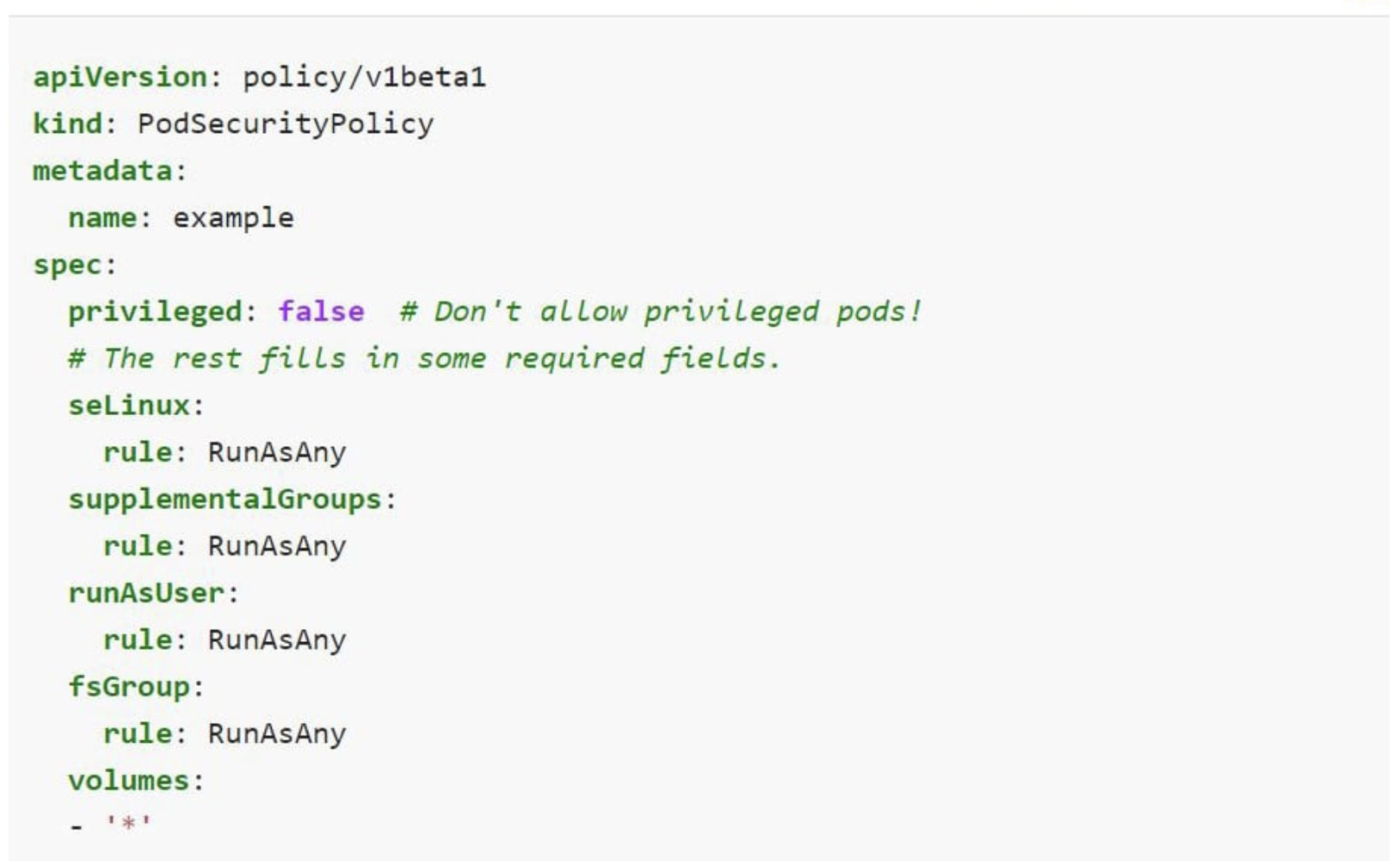Overview
We want to configure strict enforcement of rules to limit unauthorized manipulation of our kubernetes cluster.
Pod Security Standards vs Pod Security Policies
| PSS Policy | PSS Control | Mapping to PSP Control |
|---|---|---|
Baseline | Host Namespaces | Usage of host namespaces Usage of host networking and ports |
Privileged Containers | Running of privileged containers | |
Capabilities | Linux capabilities | |
HostPath Volumes | Usage of the host filesystem | |
Host Ports | Not covered in PSP | |
AppArmor (optional) | The AppArmor profile used by containers | |
SELinux (optional) | The SELinux context of the container | |
/proc Mount Type | The Allowed Proc Mount types for the container | |
Sysctls | The sysctl profile used by containers | |
Restricted | Volume Types | Usage of volume types Allow specific FlexVolume drivers Requiring the use of a read-only root file system |
Privilege Escalation | Restricting escalation to root privileges | |
Running as Non-root | Not covered in PSP | |
Non-root groups | Allocating an FSGroup that owns the Pod's volumes The user and group IDs of the container | |
Seccomp | The seccomp profile used by containers |
The main drawbacks of the PSP are the lack of support for other resource types and a limited list of controls that don't cover some container runtime-specific parameters. PSP is planned to be deprecated in 2021, and a better alternative exists to address the same need. The actual deprecation date has been recently extended from February 1st, 2021 to May 3rd, 2021 to allow vendors that use PSP, such as Azure, to prepare for the change.
PSP is planned to be officially deprecated in Kubernetes version 1.21 and removed in version 1.25.
According to the Kubernetes deprecation policy, older versions will stop getting support nine months after the deprecation of the feature.
Example Pod Security Policy
Testing Out Violations Base on Pod Security Standard
Privileged
kubectl label --dry-run=server --overwrite ns --all pod-security.kubernetes.io/enforce=privileged
namespace/default labeled namespace/kube-node-lease labeled namespace/kube-public labeled namespace/kube-system labeled
Baseline
kubectl label --dry-run=server --overwrite ns --all pod-security.kubernetes.io/enforce=baseline
Warning: existing pods in namespace "default" violate the new PodSecurity enforce level "baseline:latest" Warning: fluent-bit-q9d8n: hostPath volumes namespace/default labeled namespace/kube-node-lease labeled namespace/kube-public labeled Warning: existing pods in namespace "kube-system" violate the new PodSecurity enforce level "baseline:latest" Warning: etcd-docker-desktop (and 3 other pods): host namespaces, hostPath volumes Warning: kube-proxy-zggs2: host namespaces, hostPath volumes, privileged Warning: storage-provisioner (and 1 other pod): hostPath volumes namespace/kube-system labeled
Restricted
kubectl label --dry-run=server --overwrite ns --all pod-security.kubernetes.io/enforce=restricted
Warning: existing pods in namespace "default" violate the new PodSecurity enforce level "restricted:latest" Warning: ckaf-kafka-0 (and 5 other pods): unrestricted capabilities, seccompProfile Warning: credential-management-5665fb95d4-ncssg (and 1 other pod): allowPrivilegeEscalation != false, unrestricted capabilities, runAsNonRoot != true, seccompProfile Warning: fluent-bit-q9d8n: allowPrivilegeEscalation != false, unrestricted capabilities, restricted volume types, runAsNonRoot != true, seccompProfile Warning: kowl-767d84f95f-qm5pj: allowPrivilegeEscalation != false, unrestricted capabilities, seccompProfile namespace/default labeled namespace/kube-node-lease labeled namespace/kube-public labeled Warning: existing pods in namespace "kube-system" violate the new PodSecurity enforce level "restricted:latest" Warning: coredns-95db45d46-skl6z (and 1 other pod): unrestricted capabilities, runAsNonRoot != true, seccompProfile Warning: etcd-docker-desktop (and 3 other pods): host namespaces, allowPrivilegeEscalation != false, unrestricted capabilities, restricted volume types, runAsNonRoot != true Warning: kube-proxy-zggs2: host namespaces, privileged, allowPrivilegeEscalation != false, unrestricted capabilities, restricted volume types, runAsNonRoot != true, seccompProfile Warning: storage-provisioner (and 1 other pod): allowPrivilegeEscalation != false, unrestricted capabilities, restricted volume types, runAsNonRoot != true, seccompProfile namespace/kube-system labeled
From the previous output, you'll notice that applying the privileged Pod Security Standard shows no warnings for any namespaces. However, baseline and restricted standards both have warnings, specifically in the kube-systemnamespace.
Adding Pod Security Standard to your Namespace
Multiple pod security standards can be enabled on any namespace, using labels. Following command will enforce the baseline Pod Security Standard, but warn and audit for restricted Pod Security Standards as per the latest version (default value)
kubectl label --overwrite ns <NAMESPACE> \ pod-security.kubernetes.io/enforce=baseline \ pod-security.kubernetes.io/enforce-version=latest \ pod-security.kubernetes.io/warn=restricted \ pod-security.kubernetes.io/warn-version=latest \ pod-security.kubernetes.io/audit=restricted \ pod-security.kubernetes.io/audit-version=latest
Example: Enable Restricted on default namespace:
kubectl label --overwrite ns default \ pod-security.kubernetes.io/enforce=restricted \ pod-security.kubernetes.io/enforce-version=latest \ pod-security.kubernetes.io/warn=restricted \ pod-security.kubernetes.io/warn-version=latest \ pod-security.kubernetes.io/audit=restricted \ pod-security.kubernetes.io/audit-version=latest
namespace/default labeled
Exemptions
You can define exemptions from pod security enforcement in order to allow the creation of pods that would have otherwise been prohibited due to the policy associated with a given namespace.
....
References
| Reference | URL |
|---|---|
| Apply Pod Security Standards at the Cluster Level | https://kubernetes.io/docs/tutorials/security/cluster-level-pss/ |
| Apply Pod Security Standards at the Namespace Level | https://kubernetes.io/docs/tutorials/security/ns-level-pss/ |
| Pod Security Admission | https://kubernetes.io/docs/concepts/security/pod-security-admission/ |
| Migrate from PodSecurityPolicy to the Built-In PodSecurity Admission Controller | https://kubernetes.io/docs/tasks/configure-pod-container/migrate-from-psp/ |
| Kubernetes Pod Security Policy Deprecation: All You Need to Know | https://blog.aquasec.com/kubernetess-policy |
